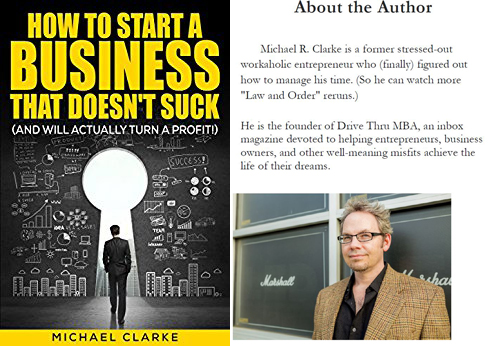How to Start a Business That Doesn’t Suck (and Will Actually Turn a Profit).
A Modestly Simple Guide to Starting a Business
by Michael R. Clarke
I have not read many books about “how to” for start-ups and usually I am bored very quickly, not to say angry. The worst was probably best-selling, The Lean Startup by Eric Ries, and the best was his mentor, Steve Blank .
I just finished “How To Start a Business That Doesn’t Suck” and I liked it very much. And it is funny (not the way Komisar mentions putting back the “fun” in funerals.com in his great The Monk and the Riddle). It is funny because it is fun to read and it is (really) informative.
If there is one thing I missed with his advice, it is how you price a product or a service. But there is so much good stuff. He begins simply with “Why You Should Definitely NOT (Under Any Circumstances) Start a Business.” [Pages 2-7]. And he is right in warning entrepreneurship is not for everyoneone. You should be passionate, crazy…
But if you are still interested, buy his book. Here are just a few good examples:
– Emphasize Learning Over Results [Page 9]
– Realize, It’s All About Value (Not Effort) [Page 11]
– [Have] A Willingness to Move FAST! (and Look Stupid) [Page 13]
– Don’t Listen to Anybody You Don’t Want (Including Me) [Page 19]
I liked very much his chapter 2 about finding an idea (not ideation!). Focus on things you know a lot about [page 26], you have strengths, and it doesn’t mean you have to be an expert. And Focus on things you are passionate about [page 29].
And then be sure to be specific enough about customer group [page 46] and do not waste time with those “that DIDN’T want a result bad enough” [Page 49]. You cannot open a donut shop, but maybe one for vegans with allergies [Page 54] (though my former, wise boss told me not to focus on Chinese food for dogs…)
I had the feeling of being a guinea pig when I read “Writers are a hidden goldmine of promotional potential. They’re also vain. (Trust me.) So email a writer/columnist in your industry and let ‘em know you liked something they wrote in that obscure trade magazine or blog. Then six months later tell ‘em about your new product. You might get some seriously awesome free promotion out of it!” [Page 71]
About products (chapter 5), I loved that customers do not care about products. They care about feelings… “I’d like to begin this chapter about “creating products and services…” …by telling you how unimportant they are. […]The only thing people care about is the result (and/or feeling) your product or service gives THEM.” [Page 84]
I was curious about his chapter 6, on business plans. I hate business plans but I liked his chapter. “Non-Sucky Business Plan Step No.1: Nail Your Elevator Pitch.” […] “Trust me: if you make a point of pitching 2-3 people a day, for the next 30 days, you will QUICKLY get a sense of what parts of your business idea people like (and don’t like).” [Page 105] And yes Clarke is right and I am wrong: “Just remember…it’s good to know the rules before you break them. And unless you have a compelling reason why ya gotta deviate from the pack, stick to the basics.”
I was also curious about what he has to say about funding, as many people hate investors. And he begins with: “Don’t read this chapter.” [Page 133] “But if I could go back and change just ONE THING in my business-building life, besides NOT fill my garage with Nascar™ fishing lures, it would be to have boot-strapped as many of my business ventures as possible and keep them lean, mean and debt-free clean.” OK right again…Still “But if I can give you one piece of advice, when it comes to prototypes, it’s this: make it LOOK good.” [Page 141]So be lean and beautiful…
I though he forgot covering teams and co-founders, but he did too! “These are not fun topics to discuss. (As a co-dependent, people-pleaser I like to avoid these types of conversations at all costs.) And it cost me thousands of dollars. (And three months of Kaiser therapy co-pays.) Because I entered into partnerships in which we had not established a clear plan for how we’d make decisions in the business. We didn’t establish who owned what when things went to crap. And we didn’t establish clearly how people would be paid if roles changed. (Yikes!) Please, if you bring on partners (even ones you’re related to) take the time to go over this uncomfortable territory.” [Page 162] and later “The key to hiring is not to hire your friends, but to “hire your weakness.” That means your staff should be:
• Hungry
• Supportive (without being a sycophant)
• And good at what you’re not.” [Page 177]
You must also read his chapter 10, about stupid mistakes he made, and you not make… Sometimes Clarke says too much he is not an expert in finance, legal, manufacturing, marketing. He may not be. But he gives damn good advice!
As a conclusion, he gives the final good advice: “the only way to find out if your business — and you as a business owner — has the potential to succeed is to let go of the trapeze you’re holding on to, and reach out for the one right in front of you. […]You learn what your strengths are. (Fast!) And you learn what your weaknesses are. (Even faster!)” [Pages 187-8]
A really beautiful and good book…

